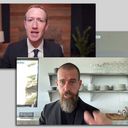Congress to tech CEOs: New laws are coming after you

Lawmakers at Thursday's hearing on misinformation were less interested in getting answers from the CEOs of Facebook, Twitter and Google than in warning the social media giants that a legislative hammer is about to land on them.
Driving the news: In a gruelingly long session conducted entirely by videoconference, members of the House Energy & Commerce Committee told the CEOs their businesses prioritize ad revenue and engagement over rooting out misinformation and content that harms users, especially children.
Why it matters: The relatively consistent lines of questioning, sometimes crossing party lines, displayed a new unity among members of Congress in their concern about the companies — and a stronger likelihood that they might pass punitive laws.
- "Your products amplify extremism," said Rep. Anna Eshoo (D-Calif.) when questioning the CEOs. "Your business models of targeted ads allow misinformation to thrive because you chase user engagement at a great cost to our society."
- "You're not passive bystanders," said Rep. Frank Pallone (D-NJ), chairman of the committee. "When you spread misinformation, actively promoting and amplifying it, you do it because you make more money."
- Facebook CEO Mark Zuckerberg repeatedly disputed these claims. "While it may be true that people might be more likely to click on it in the short term, it's not good for our business or our product or our community for this content to be there," he said. "It's not what people want, and we run the company for the long term."
What's happening: Many members are readying policy proposals targeting the underpinnings of the platforms' businesses — for example, the algorithms that recommend content to users and the companies' Section 230 liability protection for hosting user-generated content.
Where it stands: Modifying Section 230, the foundational law that allowed platforms like YouTube and Facebook to grow in the first place, is the most likely goal for Democrats this year. Pallone has made clear that he wants to amend the law to hold the platforms more accountable for amplifying false, harmful or illegal content.
- Yes, but: Thursday's hearing also made it clear that lawmakers' anger at the companies is wide-ranging and will lead in a variety of legislative directions. These include broad proposals to ban "surveillance advertising" or regulate algorithms, as well as more narrowly tailored efforts targeting the sale of illegal drugs and content designed to keep children hooked.
Meanwhile: The CEOs defended their companies' records of detecting and removing blatantly illegal and false videos and posts, and their willingness to work with advocates and law enforcement to reduce other harmful-but-not-illegal behavior on their sites, such as bullying.
- Zuckerberg, Google CEO Sundar Pichai and Twitter CEO Jack Dorsey acknowledged their content moderation efforts are imperfect and that they've made mistakes.
Between the lines: During the 5-and-a-half hour hearing, most lawmakers used their 5-minute slots to demand yes-or-no responses to complex questions, then pivoted to lecturing the CEOs.
- The yes-or-no tactic was likely designed to make the CEOs appear as if they were deflecting and hedging, but it also showed how little the members were interested in hearing what the executives had to say.
What they're saying: Questions zeroed in on racist posts against Asians and other people of color, COVID-19 vaccine misinformation, social-media addiction and the lack of diversity among tech employees.
- The tech giants were likened to the tobacco industry more than once. Rep. Bill Johnson (R-OH) said, "Big Tech is handing kids a lit cigarette, and hoping they get addicted for life."
Republicans shifted gears from previous hearings, devoting less time to their complaint that tech platforms censor conservatives and more to the idea that tech is harmful to children.
- Some lawmakers especially took issue with reports that Facebook is preparing an Instagram for people under age 13, which Zuckerberg said would be a good way for younger people to connect with friends.
- Democrats also raised concerns about children's use of the services, with Lori Trahan (D-Mass.) saying, "This committee is ready to legislate to protect our children from your ambition."
Our thought bubble: "Save the children" is a message both parties can get behind, but agreeing on what to do about it will be harder.